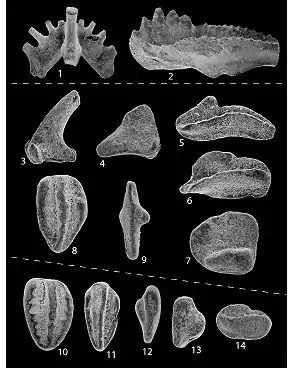Cavusgnathus
Glen K. Merrill stated in 1963 that "conodont workers have considered Idiognathoides to be a junior synonym of Polygnathodella but it now proves to be a junior synonym of Cavusgnathus. Polygnathodella and Cavusgnathus are shown to form a transitional series."[2]
| Cavusgnathus | |
|---|---|
 | |
| Pa elements, lateral view, X140 2, 5: Cavusgnathus unicornis 6, 7, 14 Cavusgnathus sp. see detail
2. gamma morphotype, from the Deer Valley Member of the Mauch Chunk Formation, Keystone quarry, Pa. 5. alpha morphotype, and 6, 7. from the uppermost Loyalhanna Limestone Member of the Mauch Chunk Formation, Keystone quarry, Pa. 14. 93RS–67, from the basal 20 cm of the Loyalhanna Limestone Member of the Mauch Chunk Formation, Keystone quarry, Pa. (93RS–79a), and Westernport, Md. | |
| Scientific classification | |
| Kingdom: | |
| Phylum: | |
| Class: | |
| Order: | |
| Family: | |
| Genus: | †Cavusgnathus |
| Species | |
| |
Cavusgnathus is an extinct genus of conodonts.
References
- New Pennsylvanian conodonts from Oklahoma. RW Harris and RV Hollingsworth, American Journal of Science, March 1933, series 5, volume 25, no. 147, pages 193-204, doi:10.2475/ajs.s5-25.147.193
- Polygnathodella Harlton, 1933, or Idiognathoides Harris and Hollingsworth, 1933? Glen K. Merrill, Journal of Paleontology, March 1963, volume 37, issue 2 (abstract)
External links
- "Cavusgnathus" at the Encyclopedia of Life
- Cavusgnathus at fossilworks.org (retrieved 10 July 2016)
This article is issued from Wikipedia. The text is licensed under Creative Commons - Attribution - Sharealike. Additional terms may apply for the media files.